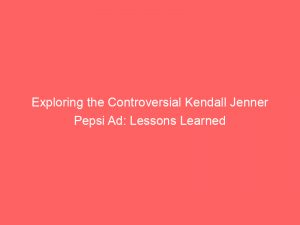- kendall jenner pepsi
- Kendall Jenner Pepsi Ad Sparks Backlash
- Accusations Of Appropriating Black Lives Matter Movement
- Pepsi Apologizes And Pulls Controversial Ad
- Peaceful Protest Depicted In Ad Comes Under Fire
- Jenner’s Offer Of Pepsi To Police Officer Trivialized Urgent Issues
- Activists And Twitter Users Call For Boycott Of Pepsi
- Pepsi Defends Ad, Cites Legacy Of Dr. King
- Trend Of Companies Using Political Messaging For Marketing
In a world filled with media spectacles and viral sensations, one particular advertisement managed to capture the attention of millions, igniting a firestorm of controversy that resonated far beyond its duration. Pepsi’s ill-fated commercial, starring the renowned model KendallJenner, became an unexpected lightning rod for criticism and discourse.
Set against the backdrop of a protest march, the ad’s misguided attempt to bridge the gap between consumers and social activism instead sparked outrage, accused of trivializing real-life issues and appropriating the profound significance of the Black Lives Matter movement. Join us as we delve into the heart of this captivating story, exploring the profound impact and ultimate redemption of Pepsi’s ill-conceived campaign.
| Item | Details |
|---|---|
| Topic | Exploring the Controversial Kendall Jenner Pepsi Ad: Lessons Learned |
| Category | Ads |
| Key takeaway | In a world filled with media spectacles and viral sensations, one particular advertisement managed to capture the attention of millions, igniting a firestorm of controversy that re |
| Last updated | December 27, 2025 |
jenner-pepsi">kendall jenner pepsi
The Kendall Jenner Pepsi ad was met with widespread condemnation and accusations of appropriating the Black Lives Matter movement. The ad depicted a peaceful protest with attractive demonstrators holding placards reading “peace” and “love” and “join the conversation,” with Jenner eventually offering a Pepsi to a police officer.
The ad sparked criticism for trivializing urgent issues and appropriating a racial protest movement. Activists and Twitter users called for a boycott of Pepsi products.
Although Pepsi apologized and stated they meant no disrespect, the ad was seen as misguided and inappropriate. Ultimately, the ad failed due to insensitivity and an exaggerated attempt at faux-wokeness to sell a product.Key Points:
- Kendall Jenner Pepsi ad condemned for appropriating Black Lives Matter movement
- Depicts peaceful protest with attractive demonstrators holding placards
- Critics argue ad trivializes urgent issues and appropriates racial protest movement
- Activists and Twitter users call for boycott of Pepsi products
- Pepsi apologizes and denies disrespect, but ad is considered misguided and inappropriate
- Ad fails due to insensitivity and exaggerated attempt at faux-wokeness
Sources
https://www.nbcnews.com/news/nbcblk/pepsi-ad-kendall-jenner-echoes-black-lives-matter-sparks-anger-n742811
https://time.com/4726500/pepsi-ad-kendall-jenner/
https://en.wikipedia.org/wiki/Pepsi:_Live_for_Now
https://mashable.com/article/the-boys-kendall-jenner-pepsi-commercial
Check this out:
💡 Pro Tips:
1. Consider the potential backlash before using controversial social issues in advertising campaigns.
2. Conduct extensive research on the cultural and historical context of the issue you’re addressing in your ad to avoid appropriating movements or trivializing important causes.
3. Engage with diverse perspectives, including critics and activists, to get an informed understanding of the potential impact of your ad.
4. Prioritize authenticity over trying to appear “woke” or tapping into current trends. Consumers can often sense insincerity and exaggerated attempts to be socially conscious.
5. Be transparent and open to feedback. If your ad misses the mark, acknowledge the mistake, apologize genuinely, and take appropriate action to rectify the situation.
Kendall Jenner Pepsi Ad Sparks Backlash
Pepsi recently released an advertisement featuring Kendall Jenner joining a protest march, which immediately sparked a wave of condemnation and backlash. The ad aimed to portray unity and inclusivity, but its execution left much to be desired.
Many viewers found the ad to be tone-deaf and inappropriate, accusing Pepsi of trivializing significant social and political issues.
Accusations Of Appropriating Black Lives Matter Movement
The most significant criticism aimed at the Pepsi ad was the accusation of appropriating the Black Lives Matter movement. The ad depicted a peaceful protest with attractive demonstrators holding placards reading “peace,” “love,” and “join the conversation.” Kendall Jenner, a well-known model, hands a Pepsi to a police officer amidst cheers from the crowd.
This scene drew immense criticism for trivializing urgent issues and appropriating a racial protest movement for commercial gain.
Notable activists, including DeRay McKesson and Bernice King, expressed their disappointment with the ad. They argued that reducing the complexities of movements like Black Lives Matter to a simple, feel-good gesture with a can of Pepsi undermines the struggle for justice and equality that these movements represent.
Pepsi Apologizes And Pulls Controversial Ad
In response to the overwhelming backlash, Pepsi issued an apology and swiftly pulled the ad. They acknowledged that their intention was never to trivialize serious issues or offend anyone.
The company stated that they believed in the power of unity, peace, and understanding but recognized that they had missed the mark with this particular ad. Pepsi assured the public that they would learn from this experience and reassess their future marketing campaigns.
Peaceful Protest Depicted In Ad Comes Under Fire
The depiction of a peaceful protest in the ad also faced scrutiny. Critics raised concerns that Pepsi’s portrayal of activism was simplistic and idealistic, ignoring the realities of protests and activism.
The ad showcased a diverse group of demonstrators holding signs with messages like “peace” and “love.” However, many argued that this portrayal failed to capture the complexity, anger, and urgency often present in real-life protests.
Jenner’s Offer Of Pepsi To Police Officer Trivialized Urgent Issues
The pivotal moment of the ad, where Kendall Jenner hands a Pepsi to a police officer, ignited significant backlash. Critics argued that this scene trivialized urgent social issues by suggesting that a soft drink could magically bridge the gap between protesters and law enforcement.
Accusations of co-opting movements such as Black Lives Matter and using them to sell a product intensified as a result.
Activists And Twitter Users Call For Boycott Of Pepsi
As news of the controversial Pepsi ad spread, activists and social media users rallied together, calling for a boycott of Pepsi products. Twitter became a platform for the public to express their outrage, using hashtags such as #BoycottPepsi to amplify their voices.
The public’s swift and collective response sent a strong message to Pepsi, reinforcing the need for companies to be mindful and responsible when addressing sensitive social and political issues.
Pepsi Defends Ad, Cites Legacy Of Dr. King
Pepsi defended its ad, stating that they meant no disrespect towards any social justice movement. The company cited the legacy of Dr.
Martin Luther King Jr. as inspiration, claiming that they aimed to reflect today’s generation’s desire for unity and understanding.
Fresh look at global CPC and CPM benchmarks.
However, many found this defense weak and insufficient, arguing that the ad still failed to navigate the complexities of contemporary social activism.
Trend Of Companies Using Political Messaging For Marketing
The controversial Pepsi ad is not an isolated incident in the corporate world. Companies such as Coca-Cola have also attempted to leverage counterculture and protest movements for marketing purposes in the past.
However, critics argue that the Pepsi ad stands out for its misguided and inappropriate approach. By referencing black anti-police-violence protesters and Vietnam War protesters to sell soft drinks, Pepsi demonstrated a lack of sensitivity and an exaggerated attempt at faux-wokeness.
The trend of companies using vaguely political messaging to create the idea of virtuous consumption is becoming more prevalent. Brands attempt to align themselves with topical issues to appeal to socially conscious consumers.
However, the Pepsi ad serves as a reminder that companies need to navigate these sensitive territories with care, as a misstep can have significant consequences.
In conclusion, the Kendall Jenner Pepsi ad sparked widespread backlash and condemnation for appropriating the Black Lives Matter movement and trivializing urgent social issues. The ad’s portrayal of a peaceful protest and Jenner’s offer of a Pepsi to a police officer drew immense criticism for being simplistic and failing to represent the complexities of real activism.
Activists and social media users called for a boycott of Pepsi products, prompting the company to apologize and pull the ad. This incident highlights the need for companies to approach political messaging responsibly and with a deeper understanding of the issues at hand.
Programmatic Advertising • Self-Serve DSP Platform • Performance Marketing Tips • Buy Traffic











